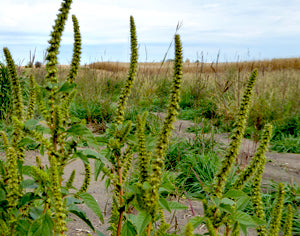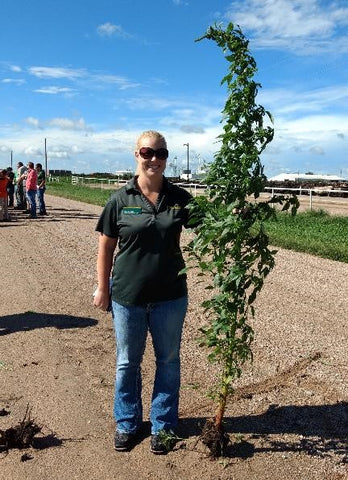Montana's next noxious weed: Palmer amaranth
Montana takes guard against Palmer amaranth, a new invasive plant
MONTANA LIVING — In Montana's battle against noxious and invasive weeds, a new player is entering the war, and it's not pretty.
It's Palmer amaranth.

Palmer amaranth is an invasive weed that is resistant to many standard herbicides.
To help educate Montana farmers and ranchers about this invasive species which has yet to hit Montana's borders, Montana State University’s Eastern Agricultural Research Center and MSU Extension will have a free half-day workshop focused on Palmer amaranth.
Palmer amaranth is a herbicide-resistant invasive weed that has spread through much of the Midwest in recent years. The workshop will be broadcast live online to Extension offices and Montana Agricultural Experiment Station research centers around the state for remote attendees who wish to tune in.
The workshop, “Palmer amaranth: It’s coming! What you need to know,” will run from 8:30 a.m. to noon on Tuesday, Nov. 5 at the Richland County Extension Office in Sidney.
The event is sponsored by the Montana Wheat and Barley Committee and the Western Sustainable Agriculture Research and Education program.

Palmer amaranth can grow 2-3 inches per day to a height of 6 feet or taller.
The grass produces up to half a million seeds per plant and is resistant to nearly all herbicides commonly available to producers for weed management. Farmers and ranchers across Montana need to take immediate action to identify and prevent its establishment in the state, according to Frankie Crutcher, assistant professor of plant pathology at the Eastern Agricultural Research Center.
The workshop is designed to provide participants with the tools necessary to do that.
The workshop will feature speaker Jason Bond, a weed control specialist from Mississippi State University Extension. Bond works with the Delta Research and Extension Center and will discuss the problems that Mississippi producers have faced trying to control Palmer amaranth and what they’ve learned in the process that can be applied in Montana.
Bond will be joined by Brian Jenks, a weed scientist at the North Central Research Extension Center in Minot, North Dakota; John Gaskin and Natalie West, a molecular botanist and plant ecologist with the U.S. Department of Agriculture’s Northern Plains Agricultural Research Laboratory in Sidney; Tim Fine, a Richland County Extension agent; and Tim Seipel, an MSU Extension cropland specialist.
Topics will include identification tips, potential biocontrol options, answers to the grass’s herbicide resistance, steps Montanans can take to avoid infestations and the potential for drones in scouting for Palmer amaranth.
Speakers will also hold a panel discussion with attendees to answer any additional questions. Attendees will be able to earn points toward pesticide licenses through the Montana Department of Agriculture.





Leave a comment